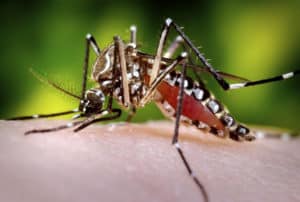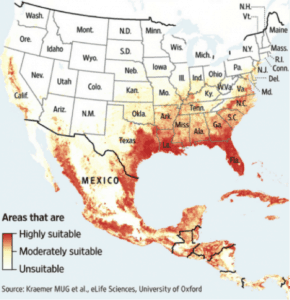Alphabet, Google’s parent company, owns and operates the biotechnology company Verily. The company, formerly known as Google Life Sciences, is receiving a lot of attention with an ongoing project. Verily is releasing bacteria-infected mosquitoes in Central California with the goal of reducing the Aedes aegypti mosquito population – known carriers of the Zika, dengue and chikungunya viruses.

Here’s how it works: Verily infects captive male Aedes aegypti mosquitoes with Wolbachia bacteria, a naturally occurring bacteria that affects many insects, but not the wild Aedes aegypti mosquitoes, then releases them in groups of up to 1 million at a time. When these special Wolbachia-infected mosquitoes mate with wild females, they produce no offspring, because infected males and uninfected females cannot reproduce together. As more infected males are introduced to a given environment, more mating will involve the infected male mosquitoes, decreasing the overall population of potentially harmful Zika-carrying mosquitoes. Better yet, male mosquitos do not bite humans, so Verily’s mosquitoes won’t be a nuisance for people in the area.
Verily’s mosquito control initiative comes a year after concerns were raised over the spread of Zika, and particularly its effects on pregnant women. The Zika virus threatens to cause birth defects and rare but severe neurological complications everywhere from Rio de Janeiro to Singapore to Miami. Zika is not the only health concern posed by mosquitoes. Deaths caused by dengue, a serious and prevalent mosquito-borne disease in the developing world, increased worldwide by 48.7% between 2005 and 2015. Additionally, the West Nile Virus and chikungunya have both entered the international spotlight in the past 20 years as diseases of significant concern. Epidemics of yellow fever, another disease transmitted by the Aedes aegypti mosquito, have depleted global vaccine stockpiles as recently as 2016 and stoked fears of outbreaks in major cities in China and Brazil.

Faced with the threat posed by Zika and other diseases, researchers quickly began to target the common denominator, the Aedes aegypti mosquito. By controlling populations of the mosquito in areas where the risk of transmission of these diseases is high, scientists could help protect populations from outbreaks of diseases like Zika. The scientific community developed several methods to attempt to keep mosquito populations in check, from irradiating the mosquitoes to changing their DNA with genetic engineering. The sterile insect technique (SIT) had used radiation to neuter pests. Brazil most recently adopted SIT to fight Zika. British biomedical company Oxitec has introduced mosquitoes genetically modified to produce nonviable offspring into populations in Brazil and India. Authorities in Florida and Houston, TX are considering the approach as well.

The results of these vector-control measures vary. Radiation from SIT has been very successful in controlling populations of insects such as moths and fruit flies, but has shown less promising results when applied to mosquito populations, as the irradiated male mosquitoes raised aren’t very good at finding mates. Being unable to find mates and prevent female mosquitoes from producing viable offspring, these SIT mosquitoes have little effect on the overall population. Genetic modification, by contrast, doesn’t impede breeding, and reportedly cut mosquito populations by up to 95% in one Brazilian test. Wolbachia mosquitoes have done even better, allegedly reducing new mosquito offspring by 99% in China’s test. Moreover, use of the Wolbachia bacteria is less controversial than genetic modification, and has won broad support for a trial in Florida, where a trial for Oxitec genetically modified mosquitoes previously stalled due to public opposition to genetic engineering.
In many ways, Verily’s efforts represent the best hope for mosquito control yet. Besides being effective at reducing Aedes aegypti populations without the use of controversial radiation or genetic engineering, Wolbachia infections show evidence of reducing dengue and Zika incubation in infected mosquitoes, and at least one strain has shown the ability to slowly and unevenly spread through Aedes populations via infected offspring. In other particularly promising words, Wolbachia may both reduce mosquito populations and render the survivors less harmful to humans. However, a caveat: none of these methods have demonstrated that they actually reduce disease transmission to humans. Until scientists can prove that Wolbachia works to prevent viral spread, Verily and its special mosquitoes face an uncertain role in disease control and prevention.
